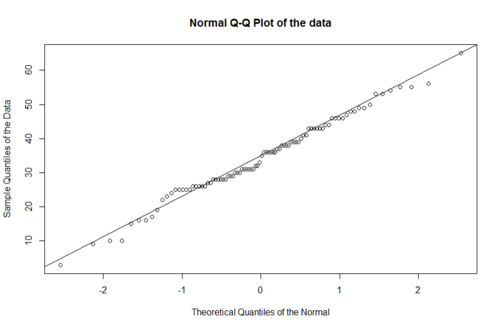Difference between revisions of "SMHS DataSimulation"
(→Scientific Methods for Health Sciences - Data Simulation) |
|||
| Line 4: | Line 4: | ||
Using the [[SOCR_Simulated_HELP_Data|SOCR Health Evaluation and Linkage to Primary (HELP) Care Dataset]] we can [https://umich.instructure.com/files/354289/download?download_frd=1 extract some sample data (00_Tiny_SOCR_HELP_Data_Simmulation.csv)]. | Using the [[SOCR_Simulated_HELP_Data|SOCR Health Evaluation and Linkage to Primary (HELP) Care Dataset]] we can [https://umich.instructure.com/files/354289/download?download_frd=1 extract some sample data (00_Tiny_SOCR_HELP_Data_Simmulation.csv)]. | ||
| − | # data_1 <- read.csv(' | + | # data_1 <- read.csv('00_Tiny_SOCR_HELP_Data_Simmulation.csv',as.is=T, header=T) |
# data_1 = read.csv(file.choose( )) | # data_1 = read.csv(file.choose( )) | ||
| − | # data_1 <- read.table(' | + | # data_1 <- read.table('00_Tiny_SOCR_HELP_Data_Simmulation.csv', header=TRUE, sep=",", row.names="ID") |
| − | + | ||
attach(data_1) | attach(data_1) | ||
| − | # | + | # i2 maximum number of drinks (standard units) consumed per day (in the past 30 days range 0–184) see also i1 |
| − | |||
| − | |||
# treat randomization group (0=usual care, 1=HELP clinic) | # treat randomization group (0=usual care, 1=HELP clinic) | ||
# pcs SF-36 Physical Component Score (range 14-75) | # pcs SF-36 Physical Component Score (range 14-75) | ||
# mcs SF-36 Mental Component Score(range 7-62) | # mcs SF-36 Mental Component Score(range 7-62) | ||
# cesd Center for Epidemiologic Studies Depression scale (range 0–60) | # cesd Center for Epidemiologic Studies Depression scale (range 0–60) | ||
| − | # | + | # indtot Inventory of Drug Use Con-sequences (InDUC) total score (range 4–45) |
# pss_fr perceived social supports (friends, range 0–14) see also dayslink | # pss_fr perceived social supports (friends, range 0–14) see also dayslink | ||
# drugrisk Risk-Assessment Battery(RAB) drug risk score (range0–21) | # drugrisk Risk-Assessment Battery(RAB) drug risk score (range0–21) | ||
# satreat any BSAS substance abuse treatment at baseline (0=no,1=yes) | # satreat any BSAS substance abuse treatment at baseline (0=no,1=yes) | ||
| − | + | ===Fragment of the data=== | |
<center> | <center> | ||
{| class="wikitable" style="text-align:center; " border="1" | {| class="wikitable" style="text-align:center; " border="1" | ||
| Line 38: | Line 36: | ||
|} | |} | ||
</center> | </center> | ||
| − | |||
| − | |||
===Testing section=== | ===Testing section=== | ||
Revision as of 14:33, 20 January 2016
Contents
Scientific Methods for Health Sciences - Data Simulation
Importing observed data for exploratory analytics
Using the SOCR Health Evaluation and Linkage to Primary (HELP) Care Dataset we can extract some sample data (00_Tiny_SOCR_HELP_Data_Simmulation.csv).
# data_1 <- read.csv('00_Tiny_SOCR_HELP_Data_Simmulation.csv',as.is=T, header=T)
# data_1 = read.csv(file.choose( ))
# data_1 <- read.table('00_Tiny_SOCR_HELP_Data_Simmulation.csv', header=TRUE, sep=",", row.names="ID")
attach(data_1) # i2 maximum number of drinks (standard units) consumed per day (in the past 30 days range 0–184) see also i1 # treat randomization group (0=usual care, 1=HELP clinic) # pcs SF-36 Physical Component Score (range 14-75) # mcs SF-36 Mental Component Score(range 7-62) # cesd Center for Epidemiologic Studies Depression scale (range 0–60) # indtot Inventory of Drug Use Con-sequences (InDUC) total score (range 4–45) # pss_fr perceived social supports (friends, range 0–14) see also dayslink # drugrisk Risk-Assessment Battery(RAB) drug risk score (range0–21) # satreat any BSAS substance abuse treatment at baseline (0=no,1=yes)
Fragment of the data
| ID | i2 | age | treat | homeless | pcs | mcs | cesd | indtot | pss_fr | drugrisk | sexrisk | satreat | female | substance | racegrp |
|---|---|---|---|---|---|---|---|---|---|---|---|---|---|---|---|
| 1 | 0 | 25 | 0 | 0 | 49 | 7 | 46 | 37 | 0 | 1 | 6 | 0 | 0 | cocaine | black |
| 2 | 18 | 31 | 0 | 0 | 48 | 34 | 17 | 48 | 0 | 0 | 11 | 0 | 0 | alcohol | white |
| 3 | 39 | 36 | 0 | 0 | 76 | 9 | 33 | 41 | 12 | 19 | 4 | 0 | 0 | heroin | black |
| … | |||||||||||||||
| 100 | 81 | 22 | 0 | 0 | 37 | 17 | 19 | 30 | 3 | 0 | 10 | 0 | 0 | alcohol | other |
Testing section
summary(data_1) x.norm <- rnorm(n=200, m=10, sd=20) hist(x.norm, main="N(10,20) Histogram") hist(x.norm, main="N(10,20) Histogram") mean(data_1$age) sd(data_1$age)
Simulate new data to match the properties/characteristics of observed data
i2 [0: 184]
age m=34,sd=12
treat {0,1}
homeless {0,1}
pcs 14-75
mcs 7-62
cesd 0–60
indtot 4-45
pss_fr 0-14
drugrisk 0-21
sexrisk
satreat (0=no,1=yes)
female (0=no,1=yes)
racegrp (black, white, other)
# Demographics variables
Sex <- ifelse(runif(NumSubj)<.5,0,1)
Weight <- as.integer(rnorm(NumSubj, 80,10))
Age <- as.integer(rnorm(NumSubj, 62,10))
# Diagnosis:
Dx <- c(rep("PD", 100), rep("HC", 100), rep("SWEDD", 82))
# Genetics
chr12_rs34637584_GT <- c(ifelse(runif(100)<.3,0,1), ifelse(runif(100)<.6,0,1), ifelse(runif(82)<.4,0,1)) # NumSubj Bernoulli trials
chr17_rs11868035_GT <- c(ifelse(runif(100)<.7,0,1), ifelse(runif(100)<.4,0,1), ifelse(runif(82)<.5,0,1)) # NumSubj Bernoulli trials
# Clinical # rpois(NumSubj, 15) + rpois(NumSubj, 6)
UPDRS_part_I <- c( ifelse(runif(100)<.7,0,1)+ifelse(runif(100)<.7,0,1),
ifelse(runif(100)<.6,0,1)+ ifelse(runif(100)<.6,0,1),
ifelse(runif(82)<.4,0,1)+ ifelse(runif(82)<.4,0,1) )
UPDRS_part_II <- c(sample.int(20, 100, replace=T), sample.int(14, 100, replace=T),
sample.int(18, 82, replace=T) )
UPDRS_part_III <- c(sample.int(30, 100, replace=T), sample.int(20, 100, replace=T),
sample.int(25, 82, replace=T) )
# Time: VisitTime – done automatically below in aggregator
# Data (putting all components together)
sim_PD_Data <- cbind(
rep(Cases, each= NumTime), # Cases
rep(L_caudate_ComputeArea, each= NumTime), # Imaging
rep(Sex, each= NumTime), # Demographics
rep(Weight, each= NumTime),
rep(Age, each= NumTime),
rep(Dx, each= NumTime), # Dx
rep(chr12_rs34637584_GT, each= NumTime), # Genetics
rep(chr17_rs11868035_GT, each= NumTime),
rep(UPDRS_part_I, each= NumTime), # Clinical
rep(UPDRS_part_II, each= NumTime),
rep(UPDRS_part_III, each= NumTime),
rep(c(0,6,12,18), NumSubj) # Time
)
# Assign the column names
colnames(sim_PD_Data) <- c(
"Cases",
"L_caudate_ComputeArea",
"Sex", "Weight", "Age",
"Dx", "chr12_rs34637584_GT", "chr17_rs11868035_GT",
"UPDRS_part_I", "UPDRS_part_II", "UPDRS_part_III",
"Time"
)
# some QC
summary(sim_PD_Data)
dim(sim_PD_Data)
head(sim_PD_Data)
.....

....
- SOCR Home page: http://www.socr.umich.edu
Translate this page: